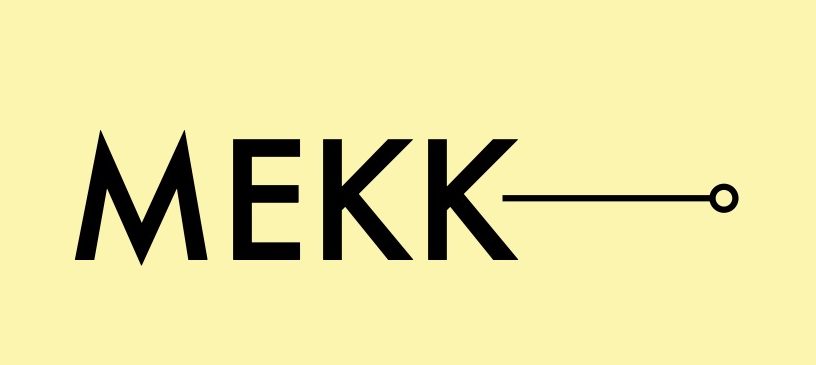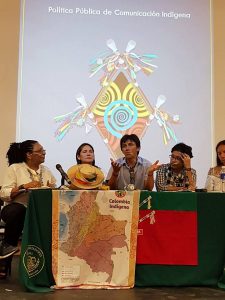
A very untraditional event took place this summer at the IAMCR conference in Cartagena. Indigenous people came together to create their own declaration. Head of MEKK, Roy Krøvel joined as convenor and moderator of this unconventional seminar called “Minga of Thought -Communication and Indigenous Peoples”. 200 journalists, researchers and leaders from all over the world, in addition to ingenious groups from North and Latin-America were gathered to create the Minga.There were no call for papers, but rather a space for dialogue was created, where a declaration was written. The occasion was inspired from the indigenous word “Minga.”
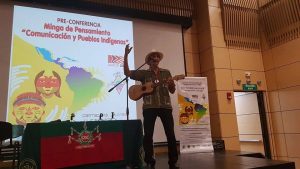
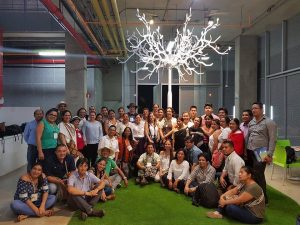
“Minga” means to circulate, making every physical and spiritual force meet in the Minga, I means to construct unity from the vision of the people, and looks for ways to improve communication, food autonomy and to revitalize the mother tongue, always seeking dialogue between human beings and Mother Nature in order to remain in harmony and balance. In the Nasa tradition, Minga is “pi” txya or pi “txyuwe”, an invitation from a person or community to others to work for a day in partnership to carry out different tasks such as planting corn. In indigenous agriculture, work is demanding and many hands are needed. As a result, indigenous peoples use the Minga to create unity and as a strategy of solution.
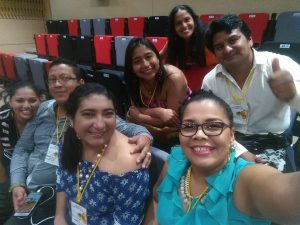
You can read the following manifesto below:
Cartagena de Indias, Colombia, 15 July 2017.
We, the Originary Peoples and Afro-descendants of Abya Yala have been walking for years in processes of struggle and resistance in defense of our collective rights and ancestral territories. This struggle reivindicates the maintenance of knowledges, know-hows, wisdoms and ancestral practices, together with the recognition of our own systems of communication, organisation, production, health, justice and education. This work has walked from diverse spaces of debate and deliberation on indigenous and intercultural communication in Abya Yala, as well as through the hard work of networking between indigenous, community and intercultural organisations, communities, universities and pluriversities.
In these spaces convened by the Originary Peoples and Nationalities of the whole continent the fundamental approach have been centered on retaining processes of reaffirmation and struggle for customs, worldviews, indigenous languages, knowledges, wisdoms and ancestral practices, as well as on preserving the territoriality of Mother Earth as a fundamental basis of the cultural roots that guide our political, economic, social and cultural positions.
As part of the continuity of these debates that are necessary to build a fabric of intercultural relations in the context of Abya Yala, we have convened indigenous and intercultural communicators, educators, facilitators, guidance counsellors, researchers, activists and students of the International Master in Intercultural Communication with a Gender Focus to meet in this Minga of Thought “Communication and Indigenous Peoples” and walk the word as a fundamental exercise for the dialogues that allows us to deepen our knowledges, know-hows, wisdoms and doings.
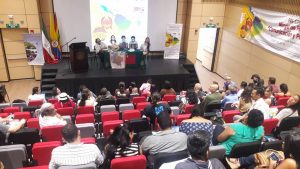
Based on the debates, shared reflections and the experiences that the participants of the Minga exchanged during several days, we state that:
First: We demand that states and society in general recognize, respect and guarantee the systems of self-education that Indigenous Peoples have been able to build and consolidate through intercultural universities, pluriversities and community education projects as legitimate places for the transmission and reproduction of ancestral knowledges, know-hows, wisdoms and practices that are essential to face the civilization crisis looming over the world, by integrating the ancestral wisdom of the grandmothers and grandparents of the Indigenous and Afro-descendant peoples in Abya Yala.
We emphasise the role of indigenous, community and intercultural universities in the development of our own communication and in the construction of dialogues and intercultural societies. In particular, we stress the dynamic role played by the Pluriversidad Amawtay Wasi (Ecuador), the Universidad Autónoma Indígena e Intercultural (UAIIN-CRIC) and the Universidad de las Regiones Autónomas de la Costa Caribe Nicaragüense (URACCAN).
We especially support the demand of the Pluriversidad Amawtay Wasi to the Ecuadorian state to recognise its contribution in educational processes of community and intercultural training, and to restore its legal status as a public and community institution for the exercise of an education of its own. In addition, we urge the state to allocate the resources and to favour the conditions that are necessary to guarantee its proper functioning in the territories of the originary peoples and nationalities.
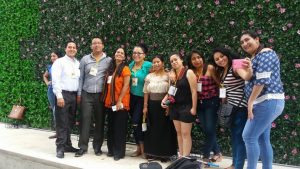
Second: We demand that states recognise, implement and provide guarantees so that Indigenous Peoples can dialogue, design, build and implement public policies in indigenous and intercultural communication, based on our realities, knowledges and practices that respond to what our communities have already mandated. Ensuring its implementation implies the readjustment of structures and institutional forms of states in coherence with the cultural diversity of the peoples. In particular, we call on the Colombian state to provide the necessary conditions for the implementation of the public policy of indigenous communication proposed by the Colombian Indigenous Peoples since 2014 and to support the processes of indigenous communication that are carried out with the complete absence of the state.
Third: We demand that states work together with us in the construction and approval of legislation and programs that allow the democratisation of the media system, generating equitable and non-discriminatory conditions for the exercise of the right to communication as a fundamental collective and human right that involves the use, appropriation and administration of our own media, technologies, software development and distribution and full and direct participation in the mass media, as stated in the United Nations Declaration on the Rights of Indigenous Peoples in its article 16. All this ought to be based on the recognition of the forms of community, interculturality and indigenous forms of communication.
We urge states to recognise the territorial rights of Indigenous Peoples, which include the use of the electromagnetic spectrum without the tax burdens and payments for concessions that have been determined by states and are burdensome for indigenous communities. This right ought to be protected insofar as the communities do not make a profitable use of such spectrum.
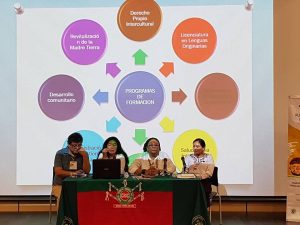
In particular, we demand that the Government of Mexico cancels all the fees and payments for the rights to use the spectrum by Indigenous Communities that offer services of cellular telephony at very low costs, removing any fiscal obligation, since its existence responds to the need to impose payments to monopolistic companies that make use of the spectrum for profit and for the accumulation of capital.
Fourth: We call for strengthening the networks that, starting as national processes, seek to share experiences and articulate actions beyond national borders and establish alliances and friendly ties beyond the indigenous communication, based on what unites us as humanity, which is life itself. In this regard, we value the efforts to resume the international processes of indigenous communication that respect the autonomy of Indigenous Peoples and without the co-optation of states.
Fifth: We urge international organisations to recognise and specifically include and differentiate the right to indigenous communication within their agendas and instruments of accountability to states and governments for their specific implementation and to establish specific standards and indicators for their measurement and compliance.
Sixth: We manifest our will to continue strengthening our walk through actions with which we continue to walk the word, strengthening the spiritual communication that maintains us in connection with Mother Earth and her principles of life.
Seventh: Those of us who participate in this Minga of thought commit ourselves to continue resisting, reaffirming the current actions from our organisations, groups and communities to continue raising awareness and claiming the importance of what we are doing in terms of communication and intercultural education as a contribution to humanity. This includes promoting from academia the spaces and actions in which the knowledges, wisdoms, know-hows and practices of the Indigenous Peoples and their contribution to confronting the civilizational crisis and to living a better society.
We celebrate the meeting space of the wisdom of feathers and academic diplomas that have allowed Indigenous Peoples to participate in the International Conference of the International Association for Media and Communication Research (IAMCR). This Minga of thought “Communication and Indigenous Peoples” wants to thank the Network of Indigenous, Intercultural and Community Universities of Abya Yala (RUIICAY), the Oslo and Akershus University College of Applied Sciences (HIOA) and the Norwegian Agency for Development Cooperation (NORAD) through the Norwegian Programme for Capacity Development in Higher Education and Research for Development (NORHED).
Finally, we thank Universidad Los Libertadores and UNIMINUTO for their unconditional support for the development and indigenous participation in this Minga of Thought.
Cartagena de Indias, 20 July 2017.
